How Can A Social Media Attorney Protect Your Online Rights?
- Last Updated: June 12th, 2025

Attorney Jessie Paluch, founder of TruLaw, has over 25 years of experience as a personal injury and mass tort attorney, and previously worked as an international tax attorney at Deloitte. Jessie collaborates with attorneys nationwide — enabling her to share reliable, up-to-date legal information with our readers.
Legally Reviewed
This article has been written and reviewed for legal accuracy and clarity by the team of writers and legal experts at TruLawsuit Info and is as accurate as possible. This content should not be taken as legal advice from an attorney. If you would like to learn more about our owner and experienced injury lawyer, Jessie Paluch, you can do so here.
Fact-Checked
TruLawsuit Info does everything possible to make sure the information in this article is up to date and accurate. If you need specific legal advice about your case, contact our team by using the chat on the bottom of this page. This article should not be taken as advice from an attorney.
Key Takeaways:
- Social media attorneys are experts who help protect your digital presence on platforms like Facebook and Twitter by advising on best practices and defending your rights in cases of copyright violations, defamation, or cyberbullying.
- Seeking the guidance of a social media lawyer is crucial when encountering online legal issues such as unauthorized use of content, privacy breaches, false statements that harm your reputation, or compliance with online communication regulations.
- These legal professionals can offer various remedies in case of internet wrongdoings, including takedown requests for harmful content and pursuing financial compensation for damages suffered due to defamation or harassment online.
How Can a Social Media Attorney Protect Your Online Rights?
On this page, we will provide an overview of how a social media attorney can protect your online rights, the role of a social media attorney related to online platforms, how to hire a social media attorney, and much more.

Intro to Hiring a Social Media Attorney
Here are a few key points to consider while hiring a Social Media Attorney:
- Identifying the Need: Social media attorneys are specialized legal professionals who focus on issues related to social media platforms, often dealing with privacy, intellectual property, and terms of service violations.
- Scope of Expertise: They are well-versed in both emerging and established laws governing digital content, online behavior, and the ever-evolving landscape of social media regulations.
- Selecting the Right Attorney: A social media attorney with a strong track record, such as TruLawsuit Info, can offer personalized guidance to protect your rights and maximize the compensation for your damages.
If you or someone you love has developed mental health issues after the overuse of social media, you may be eligible to pursue compensation.
Contact TruLawsuit Info using the chat on this page to receive an instant case evaluation from a Social Media Attorney today.
Table of Contents
The Role of a Social Media Attorney
When considering hiring a social media attorney, individuals and businesses should assess their potential legal vulnerabilities and the benefits of having a savvy legal expert on their side.
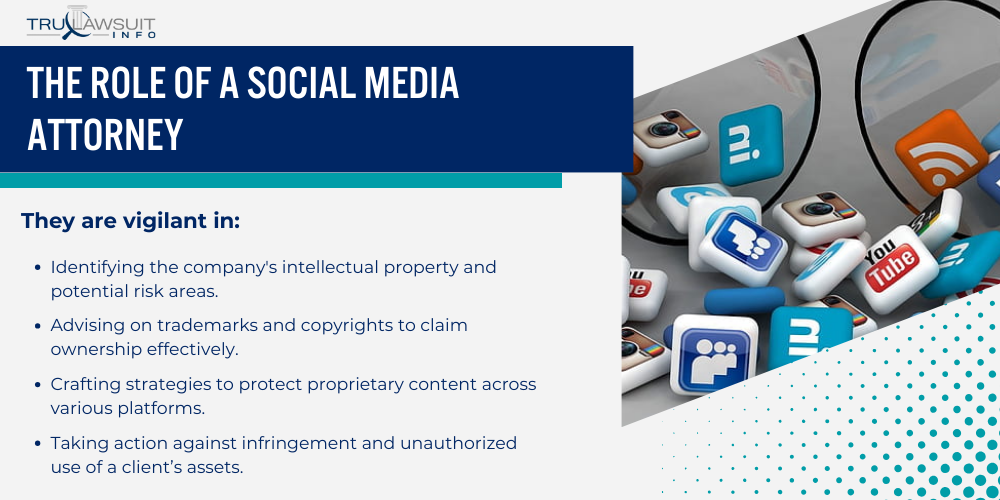
These specialized lawyers ensure the security of intellectual property, maintain compliance with evolving regulations, and adeptly handle litigation arising from online activities.
Protecting Intellectual Property
Social media attorneys offer crucial guidance to business owners and companies to safeguard their intellectual property online.
They are vigilant in:
- Identifying the company’s intellectual property and potential risk areas.
- Advising on trademarks and copyrights to claim ownership effectively.
- Crafting strategies to protect proprietary content across various platforms.
- Taking action against infringement and unauthorized use of a client’s assets.
The digital landscape has created an environment where the shareable nature of online content blurs the lines of intellectual property rights.
This dynamic has led to a constantly evolving situation where creators and users must navigate the challenges of protecting and respecting original work in the online sphere.
Ensuring Legal Compliance
Compliance with laws and regulations is a linchpin in the governance of online conduct.
Social media attorneys strive to:
- Keep abreast of the latest legal requirements and regulations regarding online conduct.
- Advise clients on implementing policies that align with these laws.
- Monitor clients’ social media activities to preclude legal issues.
- Provide training and updates to ensure clients’ practices remain compliant.
Through their expertise, social media attorneys enable clients to minimize legal risks while engaging online.
Navigating Social Media Litigation
When legal issues do arise, social media attorneys are instrumental in steering clients through the challenges of social media litigation.
Responsibilities of a social media attorney include, but are not limited to:
- Representing clients in court and formulating robust defense strategies.
- Handling claims against clients or by clients against third parties.
- Managing public relations aspects of litigation involving social media.
- Coordinating with law firms or in-house counsel to resolve disputes effectively.
Their adept negotiation and litigation skills play a decisive role in the outcome of such cases, establishing the social media law firm as an indispensable ally in the realm of digital disputes.
Social Media Attorney Perspective on Youth Mental Health
Social media attorneys emphasize the importance of balancing the promotion of business goals on social media platforms with the responsibility to protect youth mental health.
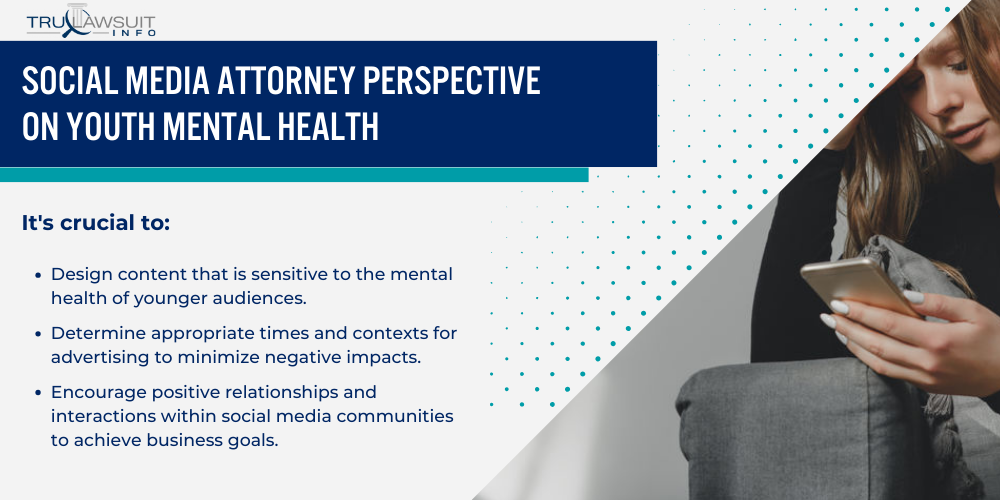
They scrutinize and guide companies’ social media efforts to ensure adherence to legal and ethical standards.
Achieving Business Goals through Social Media Use
Business owners and companies using social media need to work closely with legal professionals to align their online marketing strategies with their business goals without compromising the welfare of youth users.
It’s crucial to:
- Design content that is sensitive to the mental health of younger audiences.
- Determine appropriate times and contexts for advertising to minimize negative impacts.
- Encourage positive relationships and interactions within social media communities to achieve business goals.
- Regularly assess the influence of social media efforts on both brand reputation and user well-being.
Legal Aspects of Marketing and Advertising
Attorneys focused on the legal aspects of marketing and advertising ensure that businesses promote their services responsibly.
Precise legal guidance is required to:
- Ensure all marketing content is clear, non-misleading, and compliant with FTC regulations.
- Maintain transparent sponsorship and endorsement relationships on platforms.
- Avoid targeting vulnerable demographics with inappropriate content.
- Protect the company’s brand by enforcing intellectual property rights and addressing misrepresentation.
Managing Company’s Online Presence
Managing a company’s online presence effectively includes monitoring and adjusting the interactions to safeguard the company’s reputation.
This management requires:
- Overseeing social media accounts to prevent unauthorized use and misinformation.
- Implementing strict policies regarding user engagement and content moderation.
- Responding promptly to incidents that may affect the reputation of the business.
- Establishing guidelines for brand-promoting content that is mindful of its impact on all audience members, especially youth.
Throughout these efforts, social media attorneys work to align business interests with ethical concerns, emphasizing the need for companies to responsibly use their platforms in a way that considers the mental health and safety of young users.
Industry-Specific Social Media Laws
In the evolving landscape of social media, specific laws have emerged to govern technology companies and consumer brands, ensuring that regulations are adhered to and best practices are followed for the benefit of users and the wider community.
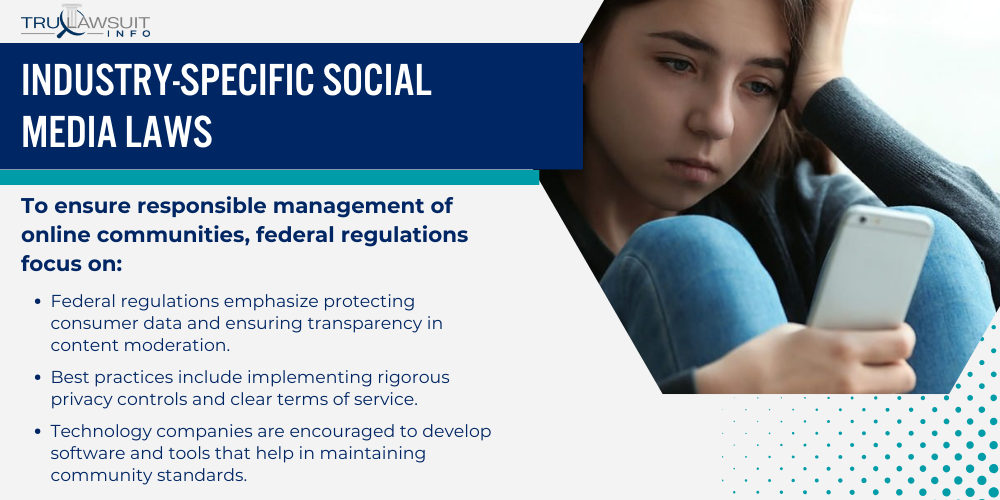
Technology Companies and Social Media
Technology companies operate at the forefront of innovation, often creating the platforms where social media interaction takes place.
As such, they are subject to both federal laws and industry-specific regulations to ensure they responsibly manage the content and the community they serve.
To ensure responsible management of online communities, federal regulations focus on:
- Federal regulations emphasize protecting consumer data and ensuring transparency in content moderation.
- Best practices include implementing rigorous privacy controls and clear terms of service.
- Technology companies are encouraged to develop software and tools that help in maintaining community standards.
- Regular compliance audits are vital to identify any potential regulation breaches in advance.
Recent Supreme Court deliberations have highlighted debates on the constitutionality of state laws affecting how these companies can moderate user content.
Consumer Brands on Social Media
Consumer brands utilize social media to engage with their customers and cultivate their community presence.
These interactions must align with industry regulations as well as platform-specific rules to protect both the brand and consumer interests.
Here’s how brands can ensure responsible social media practices:
- Brands need to ensure all content is accurate and not misleading to maintain trust.
- Observance of intellectual property laws to respect the creation of content by others is critical.
- Consumer brands need to adhere to advertising standards and consumer protection laws.
- Community engagement should be managed to foster a respectful and inclusive environment for all users.
Compliance with rules like the Federal Trade Commission’s (FTC) guidelines concerning endorsements and testimonials in advertising is a benchmark in the industry.
When Do You Need a Social Media Attorney?
Engaging a Social Media Attorney is essential when legal issues arise from the digital footprint of a business or individual.
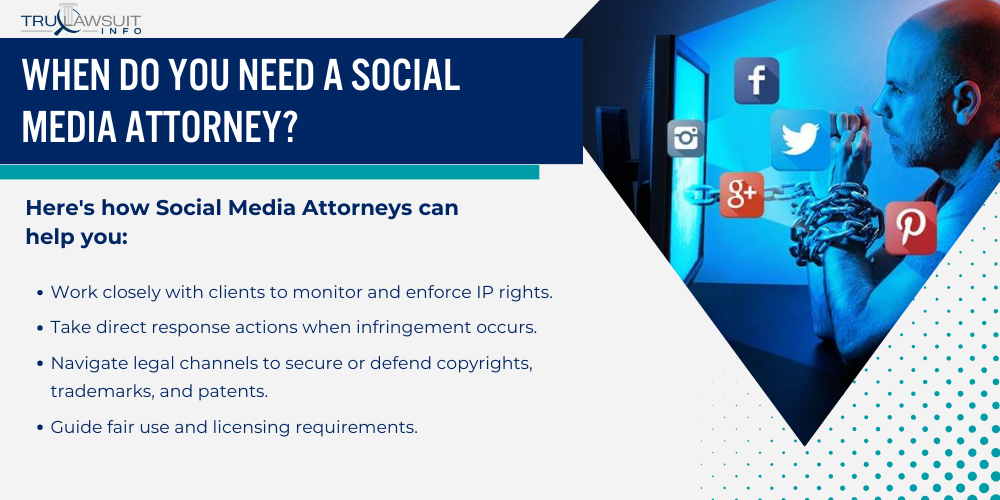
They are skilled in addressing challenges that come with the dynamic social media landscape.
Defending Intellectual Property Rights
Social Media Attorneys protect intellectual property rights by ensuring that online creative property and businesses maintain control over their creations.
Here’s how Social Media Attorneys can help you:
- Work closely with clients to monitor and enforce IP rights.
- Take direct response actions when infringement occurs.
- Navigate legal channels to secure or defend copyrights, trademarks, and patents.
- Guide fair use and licensing requirements.
Advising on Social Media Policies
Attorneys specializing in social media advise companies on establishing comprehensive policies.
Their expertise helps to:
- Create rules that ensure employees’ online activities align with the company’s social media efforts.
- Protect company and personal data against misuse.
- Incorporate data protection regulations into social media practice.
- Train employees on issues of confidentiality and privacy.
Handling Sensitive Information
Sensitive information and personal data require meticulous handling by a legal team proficient in social media law.
Tasks include:
- Drafting policies to shield confidential information from public exposure.
- Providing strategies for data protection and privacy compliance.
- Responding to breaches involving personal data with a clear strategy.
- Offering counsel on privacy issues arising from the company’s social media efforts.
Practical Considerations for Hiring a Social Media Attorney
When considering hiring a social media attorney, businesses must weigh the benefit of legal expertise against the specific needs of their social media use.
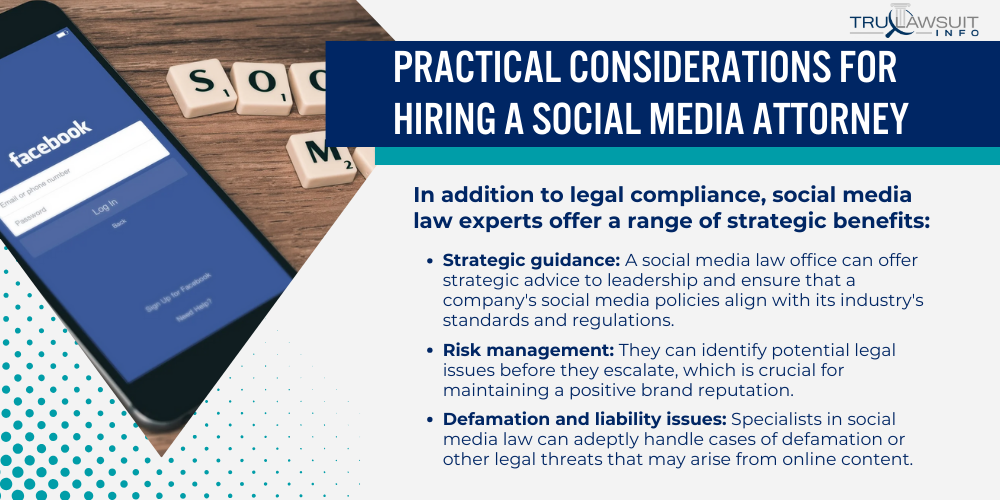
This expertise is pivotal in ensuring compliance with fast-changing regulations on platforms like Facebook and Twitter.
Benefits of Legal Expertise in Social Media
Legal expertise in social media brings numerous advantages to a business’s operations.
An attorney with this specialization will understand the nuances of user agreements and protect the interests of the company.
In addition to legal compliance, social media law experts offer a range of strategic benefits:
- Strategic guidance: A social media law office can offer strategic advice to leadership and ensure that a company’s social media policies align with its industry’s standards and regulations.
- Risk management: They can identify potential legal issues before they escalate, which is crucial for maintaining a positive brand reputation.
- Defamation and liability issues: Specialists in social media law can adeptly handle cases of defamation or other legal threats that may arise from online content.
- Adherence to advertising laws: They ensure that marketing efforts through social media channels comply with advertising laws, preventing potential fines and legal disputes.
Understanding User Agreements and Rights
Social media platforms each have their user agreements and terms of service, which often include complex legal language that can have significant implications for users and businesses.
Here’s how a social media attorney can help:
- Interpretation of terms: A social media attorney can interpret the terms of service for platforms, helping businesses understand their rights and obligations.
- Negotiating agreements: If necessary, they may negotiate agreements with social media companies on behalf of the business.
- Policy compliance: They ensure a business’s social media practices comply with existing laws and the specific terms of service of each platform.
- User rights protection: An attorney can guide users in protecting their rights when interacting with business people on social media, which can help maintain trust and engagement within the community.
Building Client Relationships
In the realm of social media attorneys, building and maintaining robust client relationships is pivotal for success.
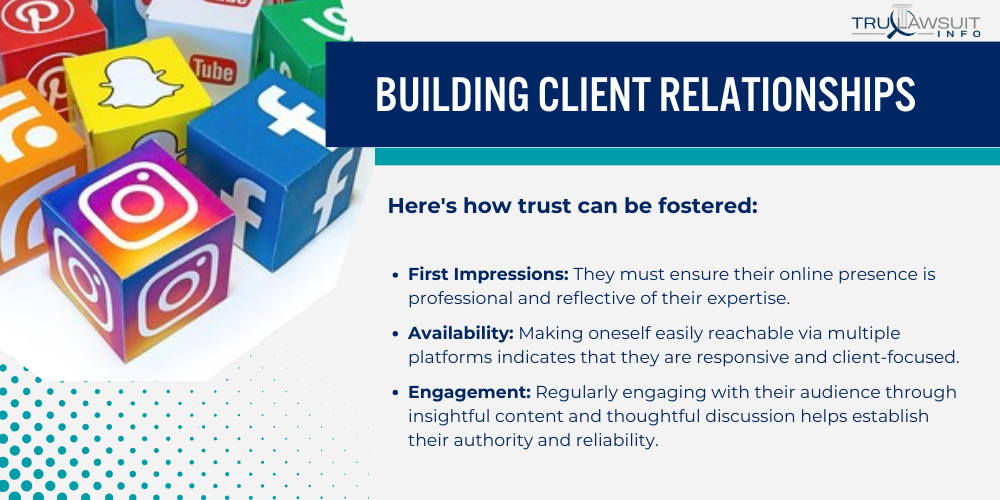
This process is anchored in trust and effective communication.
Establishing Trust with Potential Clients
Building trust with potential clients lays the foundational bedrock for lasting relationships.
It is through trust that clients feel comfortable sharing sensitive information and relying on an attorney’s guidance.
Here’s how trust can be fostered:
- First Impressions: They must ensure their online presence is professional and reflective of their expertise.
- Availability: Making oneself easily reachable via multiple platforms indicates that they are responsive and client-focused.
- Engagement: Regularly engaging with their audience through insightful content and thoughtful discussion helps establish their authority and reliability.
- Consistency: Consistently providing accurate and timely information builds a reputation for reliability.
In each interaction, whether it’s an initial consultation or a regular update, maintaining a knowledgeable and clear tone helps reinforce their position as an authority in their field.
The attorney aims to make potential clients feel they’ve chosen the right person for their legal needs, ensuring a solid ongoing relationship.
Future of Social Media Law
The terrain of social media law is constantly changing, driven by technological advancements and an evolving regulatory landscape.
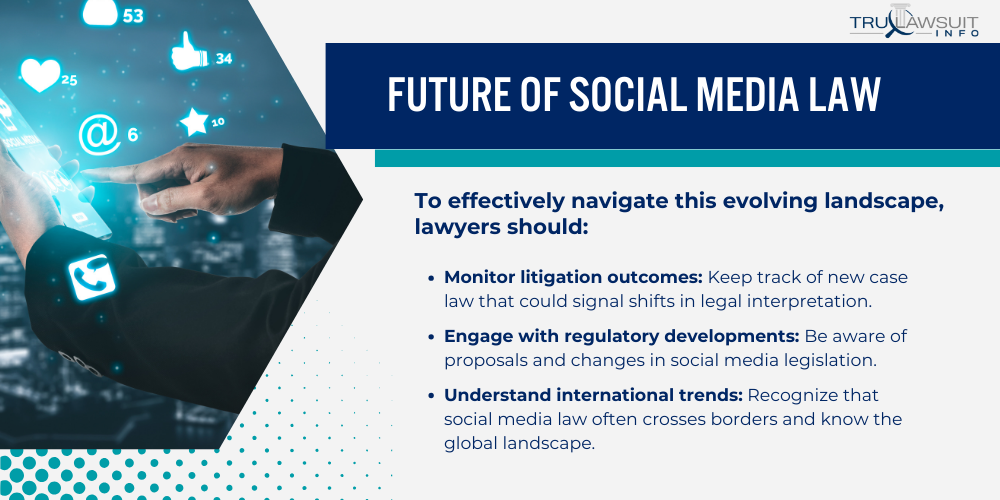
Attorneys in this field must continuously absorb new knowledge and adjust strategies to stay relevant.
Staying at the Forefront of Legal Development
Attorneys must embody a proactive approach to remain at the forefront of social media law.
The legal framework surrounding social media is in flux, reflecting societal and technological changes.
To effectively navigate this evolving landscape, lawyers should:
- Monitor litigation outcomes: Keep track of new case law that could signal shifts in legal interpretation.
- Engage with regulatory developments: Be aware of proposals and changes in social media legislation.
- Understand international trends: Recognize that social media law often crosses borders and know the global landscape.
- Pursue continual education: Participate in continuous learning to keep up with the evolution of the industry.
Constant vigilance in these practice areas is essential for legal professionals to provide informed counsel to clients within this dynamic world.
Adapting to New Platforms and Technologies
As emerging platforms and innovative technologies reshape the social media industry, legal strategies must adapt accordingly.
To stay ahead of the curve, lawyers should focus on several key areas:
- Grasp technological underpinnings: Understand the technology behind new platforms to anticipate legal challenges.
- Identify new legal questions: Each innovation may introduce unique regulatory concerns.
- Counsel on risk management: Provide guidance on potential legal risks associated with new social media features.
- Refine privacy practices: Advise on evolving privacy laws and best practices in data management.
Lawyers must adjust their advice and methodologies to incorporate these developments, guiding clients through the legal intricacies of new social media technologies.
Frequently Asked Questions
-
What legal issues can a social media attorney help me with?
Social media attorneys can offer guidance on various legal matters, including privacy concerns, copyright infringement, trademark misuse, and contract disputes.
They play a pivotal role in responding to legal risks associated with social media use.
-
How can I protect my intellectual property on social media platforms?
To protect your intellectual property on social media platforms, you can register trademarks and copyrights to establish legal ownership and monitor the platforms for unauthorized use of your intellectual property.
Additionally, employing digital watermarks or other identifiers on your content and acting promptly by issuing take-down notices in case of infringement can help safeguard your creative work.
-
What should I look for when hiring a lawyer for social media-related cases?
When hiring a lawyer for social media-related cases, look for someone with a proven track record in handling such cases and a deep understanding of the legal nuances of the online world.
-
Can a social media attorney assist with issues regarding defamation on platforms?
Yes, a social media attorney can help with defamation issues on social media platforms by analyzing content, guiding through removal processes, and representing in legal proceedings if necessary.
They can also provide advice on preventive measures to avoid future defamation claims.
-
What are the potential legal repercussions for influencers not complying with FTC guidelines?
Influencers not complying with FTC guidelines could face fines, corrective advertising requirements, reputational damage, and potential legal action from deceived consumers.
-
How does one handle breach of contract disputes in social media collaborations?
To protect your intellectual property on social media platforms, consider registering trademarks and copyrights to establish legal ownership.
Additionally, regularly monitor the platforms for any unauthorized use of your intellectual property and take prompt action, such as issuing take-down notices, in case of infringement.

Experienced Attorney & Legal SaaS CEO
With over 25 years of legal experience, Jessie is an Illinois lawyer, a CPA, and a mother of three. She spent the first decade of her career working as an international tax attorney at Deloitte.
In 2009, Jessie co-founded her own law firm with her husband – which has scaled to over 30 employees since its conception.
In 2016, Jessie founded TruLaw, which allows her to collaborate with attorneys and legal experts across the United States on a daily basis. This hypervaluable network of experts is what enables her to share reliable legal information with her readers!
Have A Case?
Here, at Tru Lawsuit Info, we’re committed to helping victims get the justice they deserve.
To do this, we actively work to connect them with attorneys who are experts in litigating cases similar to theirs.
Would you like our help?
Tru Lawsuit Info is a reliable source of information about issues that may affect your health and safety, such as faulty products, data breaches, and environmental hazards.
Our team of experienced writers collaborates with medical professionals, lawyers, and advocates to produce informative articles, guides, and other resources that raise awareness of these topics.
Our thorough research provides consumers with access to reliable information and updates on lawsuits happening around the country. We also can connect consumers with attorneys if they need assistance.
Camp Lejeune's water contamination issue spanned several decades starting in the 1950s. Exposure to these chemicals has been linked to various serious health issues, including cancer, organ diseases, and death.
Research is increasingly suggesting a link between the use of Tylenol during pregnancy and the development of neurodevelopmental disorders, such as autism and ADHD, in infants.
Legal action is being taken against manufacturers of Aqueous Film-Forming Foam (AFFF), a chemical used in fighting fires. The plaintiffs allege that exposure to the foam caused health issues such as cancer, organ damage, and birth and fertility issues.
Have A Case?
Here, at Tru Lawsuit Info, we’re committed to helping victims get the justice they deserve.
To do this, we actively work to connect them with attorneys who are experts in litigating cases similar to theirs.
Would you like our help?







